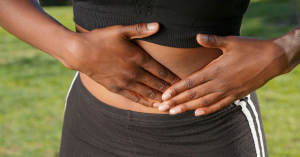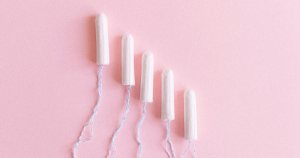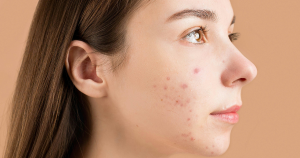So, everyone knows about the most common PCOS symptoms, right? A simple google search will bring you back to the old classics again and again on every website; irregular periods, weight gain, abnormal hair growth and acne.
Whilst it can be powerful to understand the symptoms that pop up regularly, PCOS is a complex condition that can affect sufferers differently and in sometimes odd ways. Here are X amount of the less commonly reported symptoms that many have experienced but don’t seem to get much attention in the medical journals;
- Impaired Sense of Smell
A 2016 study found that women with PCOS have significantly higher levels of olfactory disfunction, which means that the body structures that control your sense of smell don’t work as they should. As a result, many PCOS sufferers have an increased or reduced sense of smell. Some even experience ‘phantom odors’ – perceiving smells like cigarette smoke or perfume when they are not actually present.
One of the possible reasons behind this could be the higher risk of depression in people with PCOS, which is also known to affect olfactory function.
So if you have PCOS and perceive certain smells extremely strongly, or not at all, don’t worry you’re not alone!
2. Body Odour
Whilst we’re on the topic of smell, having a particular whiff to you is also a widely experienced yet weird symptom of PCOS.
Ever smelled a man’s armpits after the gym and wondered how he could smell so fruity, so quickly? Well androgens (male sex hormones) have been linked to increased sweat production, meaning that women with PCOS (who also have increased androgens) may also be sweating more.
Another factor which may influence the smell of those with PCOS is insulin resistance. I’ve talked in other articles about how insulin resistance affects the majority of people with PCOS. But did you know that the resulting high glucose levels can cause an increase of bacteria, leading to bad breath and body odour? A change
3. Dandruff
Seborrhoea dermatitis is a skin condition causing flaky patches, red skin and dandruff like shedding. Though it mostly occurs on the scalp, it may also appear on the face, upper neck and back.
Research suggests that there is a strong link between PCOS and various dermatological conditions. Increased male sex hormones, inflammation and high insulin levels may explain the connection, in that all three are known to impact the skin and in fact many are diagnosed with PCOS after first having visited a dermotologist.
Whilst it is often acne that reported en masse, these dry, rash like spots can also occur with PCOS, alongside patches of greasy skin covered by a scale-like crust.
4. Dark Spots and Texture Changes on the Vulva
PCOS can cause changes down there too! Acanthosis nigricans is a skin pigmentation disorder associated with hormonal fluctuations. It can cause dark patches on the body, which often come with a different texture – often described as thick and ‘velvet-like’.
Some people with PCOS have reported finding such spots on their vulva or inside the vaginal cavity. These spots can also have a different odour or come with dryness.
5. Eating Disorders
Extensive studies have shown that those with PCOS have higher odds of experiencing eating disorders, with Binge-eating Disorder being of particular prevalence. In fact, a recent review found that PCOS sufferers may be up to six times more likely to have an ED as opposed to control groups.
Binge-eating disorder involves regularly overeating to the point of being uncomfortably full, even sick. Normally, this involves junk foods or other foods avoided during non-binge behaviour.
Eating disorders can have a devastating impact on your mental and physical health. Both hormonal imbalances (causing food cravings) and the emotional toll of living with a chronic illness like PCOS are thought to be potential reasons why women may turn to food as a coping mechanism.
6. Food Cravings
We know about unusual food cravings in pregnancy, but did you know that this can accompany any type of hormonal imbalance? Many people with PCOS report a strong desire for carbohydrates and sweet foods like cakes, candy, chocolate and biscuits.
This can be attributed, again, to elevated insulin, which is a known appetite stimulant. Some people report cravings so strong that they feel physically ill or completely lacking in energy until they eat something high sugar.
7. PCOS Belly
Weight gain is a common symptom of polycystic ovaries, and can be caused by insulin build up in the blood stream. When the body has less ability to convert sugar in to energy, increased insulin in the blood can cause hunger and enhance fat storage. An abnormal amount of androgens (male sex hormones) in PCOS patients can also increase appetite and promote fat storage.
PCOS belly, however, looks quite different from other types of weight gain in that fat is distributed disproportionality to the abdominal area. This can make your belly and waist in particular appear large and bloated, even on otherwise lean individuals with a lower body fat percentage.
It is not known why weight seems to gather in this region as opposed to throughout the body, though many with PCOS report discomfort, bloating and difficulty in finding clothing that fits.
8. High Cholestrol & Heart Disease
Have you ever been to the doctor and despite feeling otherwise healthy, been told you have elevated levels of cholestrol? Well, this is not uncommon for those suffering from PCOS, since the link between the ovaries and the heart is actually incredibly strong.
It’s important to remember that the symptoms of PCOS are often overlapping and trigger each other in an almost cyclical nature. With weight gain and insulin-resistance being common signs of the condition, many women are at risk of developing diabetes, and women with PCOS are 3 x more likely to be prediabetic. Having prediabetes or diabetes can lead to high cholestrol and make you more likely to develop heart disease, as high blood sugar levels can damage the blood vessels in your heart and cause the development of fatty deposits.
This does not mean that having PCOS will mean that you will have a heart attack or any other type of cardiovascular event, but it does make it all the more important to maintain a healthy, balanced diet alongside regular exercise and self care.







